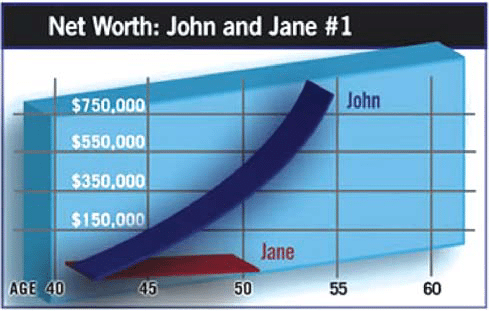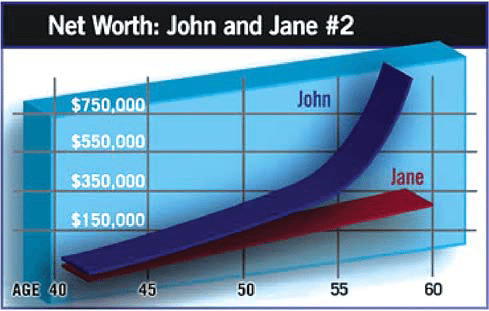
SUPPORT@ymmdcpa.com
571-310-5738

We help you achieve a fair divorce financial settlement affordably
We help you achieve a fair divorce financial settlement affordably
Why Hire a CDFA® Professional
After his divorce, David went to a financial advisor to determine how to best position his assets. Together, David and his planner decided to do a total financial plan for him. During the planning session, it became apparent that during his marriage his wife had done all of the investing. She chose all the investments, made all the decisions, and invested all the money.
At the time of their divorce she said, “Let’s just split everything 50/50. You take this half of the assets and I will take that half. Is that OK?” David answered, “Well, I guess that sounds pretty fair. That’s OK with me.”
Unfortunately, there was something he neither knew nor understood; neither did his lawyer, and neither did the judge. They didn’t realize that David would have to pay taxes on his half of the assets when he tried to access them. His ex-wife, on the other hand, could access her half of the assets tax-free. His 50/50 split cost him an additional $18,000 in taxes. Had David met with a CDFA® before the divorce was finalized, he would have been in a better position to ask for a more equitable settlement.
This parable has an unfortunate ending, but pre-divorce financial counseling can help people going through a divorce arrive at a settlement that is fully understood by all involved.
“More and more lawyers have seen the virtue of bringing a financial expert into the divorce process at the very start.”
Financial problems can tear a marriage apart, and are often the primary factor that leads to divorce. Once a decision to separate or divorce has been reached, all sorts of questions bubble to the surface. These questions are often clouded by wounded emotions and accompanied by mutual accusations, which comes as no surprise. If a couple cannot solve their financial difficulties while the marriage was underway, it is unlikely that they will be able to agree on pressing financial issues when it has fallen apart
Many divorcing couples have questions such as:
Why Hire a CDFA® Professional
“More and more lawyers have seen the virtue of bringing a financial expert into the divorce process at the very start.”
Who do people turn to for such assistance? When people think about getting a divorce, the first professional that comes to mind is an attorney. Typically a financial advisor – whether it is a Certified Public Accountant, Certified Financial Planner®, or a CDFA® – is not considered until later in the divorce process – or even until after the divorce is final.
Financial problems can tear a marriage apart, and are often the primary factor that leads to divorce. Once a decision to separate or divorce has been reached, all sorts of questions bubble to the surface. These questions are often clouded by wounded emotions and accompanied by mutual accusations, which comes as no surprise. If a couple cannot solve their financial difficulties while the marriage was underway, it is unlikely that they will be able to agree on pressing financial issues when it has fallen apart.
Many divorcing couples have questions such as:
-
Who gets what property?
- How do we value our property?
- What tax issues must we be concerned with?
-
How do we divide retirement funds and pensions?
-
How will the lower-earning spouse survive financially?
- What additional financial support does that person need?
-
Who gets the house?
-
What happens if a paying ex-spouse dies?
- How about the children's college funding?
How CDFA® Can Help A Divorcing Couple
John and Jane are 40- years-old and have two children. They own a home worth $165,000 with a net equity of $77,500. Their retirement savings total $165,500. John earns $90,000 a year and has a take-home pay of $68,760 a year. Jane has never worked outside the home and has no job skills, but hopes to get a part-time job with takehome pay of $8,900 a year.
The following settlement has been suggested. After the divorce, Jane and the children will live in the matrimonial home, which will be deeded to her. She will also receive $44,000 of the retirement savings while John will receive the remaining $121,500, thus dividing the assets equally. John will pay Jane spousal support of $600 per month for five years, and child support of $225 per month per child. He will also pay the children’s college costs, starting in four years.
John’s expenses include his normal living expenses, child support, spousal support and education costs. Jane’s expenses include support for the children, and will be reduced as each child leaves home to attend college.
At first glance, this appears to be a reasonably fair settlement. However, a detailed analysis creates the financial future illustrated in Graph 1 (below). As you can see, Jane’s assets will be completely depleted within seven years, whereas John’s investments will grow dramatically.

To improve Jane’s financial future, an alternative settlement could provide her with increased spousal support of $1,500 per month for 10 years. The correct child support for two children according to the Child Support Guidelines in their area is $1,136 per month for a payor with John’s income. Jane could also be awarded an additional $24,300 from the retirement savings plans, although she might need to cut her expenses by 10 percent.
These changes in the original settlement would produce the results illustrated in Graph 2 (below). If they are made, John will still have a surplus, which he can add to his investments. If John stays within his budget and invests all of his extra income, his investments have the capacity to grow to $2.5 million by the time he is 60.

This example illustrates the value of financial planning as a means of reaching a more equitable divorce settlement. If the court’s intent is to treat both parties in a divorce as equitably as possible, it is essential to analyze the marriage as if it were a financial contract, and a CDFA® is uniquely suited to do so.
The role of the CDFA® is to help both client and lawyer understand how the financial decisions made today will impact the client’s financial future, based on certain assumptions. A CDFA® is someone who comes from a financial planning, accounting or legal background and goes through an intensive training program to become skilled in analyzing and providing expertise related to divorce financial issues.
Information credited to Institute for Divorce Financial Analysts. A CDFA professional is someone who comes from a financial planning, accounting or legal background and goes through an intensive training program to become skilled in analyzing and providing expertise related to the financial issues of divorce.
These are the questions that family law lawyers face with each divorce case. Many lawyers struggle with the intricate financial details that concern tax issues, capital gains, dividing pensions, and so on. Additionally, even if lawyers happen to have accumulated a degree of financial expertise, they are not allowed to testify on behalf of their clients in court. This is why more and more lawyers have seen the virtue of bringing a financial expert into the divorce process at the very start. Solid information and expert analysis are important resources in their search for the best possible resolutions for their clients.
How CDFA® Can Help A Divorcing Couple:

These changes in the original settlement would produce the results illustrated in Graph 2 (below). If they are made, John will still have a surplus, which he can add to his investments. If John stays within his budget and invests all of his extra income, his investments have the capacity to grow to $2.5 million by the time he is 60.

Meet your CDFA®
Yan Zhang, CDFA®, CPA/PFS
Being a CDFA® professional since 2015. I've helped my clients through the divorce process, one of the darkest moments of their lives, in pursuing a financially fair and equitable outcome affordably.
I am also a Certified Public Accountant with nearly 15-year experience and hold a Personal Financial Specialist designation from American Institute of Certified Public Accountants.
My own first-hand experience with going through the challenge and stress of a divorce led me to pursuit a career in divorce finance. Divorce financial settlement can easily be the largest financial decision we make in the lifetime, and a mistake may often take a long time to recover.
My extensive training and experiences in taxation and personal finance have proved to be unparalled advantages my divorcing clients appreciate. I am not an lawyer and cannot render legal advices. My responsibility is to simplify, demystify and guide you through the financial-related matters of the process for divorcing couples so that you can directly control and influence your own outcome and begin a transition established upon a healthy new financial foundation for the future.
I look forward to working with you during this journey.

WHAT TO EXPECT WHEN WORKING WITH US
Work with a caring CDFA® to detangle your divorce financials
This example illustrates the value of financial planning as a means of reaching a more equitable divorce settlement. If the court’s intent is to treat both parties in a divorce as equitably as possible, it is essential to analyze the marriage as if it were a financial contract, and a CDFA® is uniquely suited to do so.
The role of the CDFA® is to help both client and lawyer understand how the financial decisions made today will impact the client’s financial future, based on certain assumptions. A CDFA® is someone who comes from a financial planning, accounting or legal background and goes through an intensive training program to become skilled in analyzing and providing expertise related to divorce financial issues.
Meet your CDFA®
Yan Zhang, CDFA®, CPA/PFS
WHAT TO EXPECT WHEN WORKING WITH ME
Transparent Pricing
Most of our divorce financial cases are completed within the range of $1,500-$3,500. We will provide you a fee estimate at the client acceptance stage based on the complexity of your financial situation.
A Network of Divorce Resources
During the divorce process, we can refer you to reputational professionals such as Family Law Attorneys, Marriage and family councelors, mortgage brokers, and realtor and real estate agents at your request. We do not receive referral fees.
YMMD Tax and Wealth Planning, LLC
8300 Boone Blvd, Suite 500, Vienna, VA 22182
By appointment only
CUSTOM JAVASCRIPT / HTML
CUSTOM JAVASCRIPT / HTML
CUSTOM JAVASCRIPT / HTML
SUPPORT@YMMDCPA.COM
571-310-5738
8300 Boone Blvd, Suite 500, Vienna, VA 22182
(BY APPOINTMENT ONLY)
Copyright 2019 - All Rights Reserved - PRIVACY POLICY - LEGAL DISCLAIMER YMMD Tax and Wealth Planning, LLC
Copyright 2019 - All Rights Reserved - PRIVACY POLICY - LEGAL DISCLAIMER - YMMD Tax and Wealth Planning, LLC
